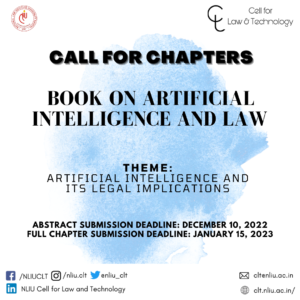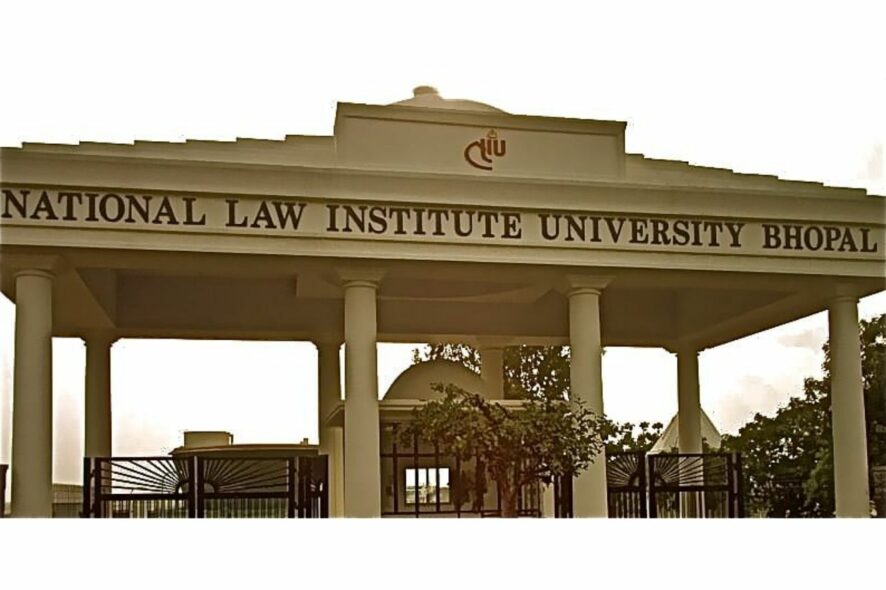NLIU Cell for Law and Technology (NLIU-CLT) is inviting submissions for its Book on Artificial Intelligence and Law.
About NLIU, Bhopal
National Law Institute University (NLIU), Bhopal has been ranked as one of the best universities in India and is considered as one of the premier legal institutions since its establishment in 1997. NLIU is recognized by the University Grants Commission and the Bar Council of India. Our mission is to develop and nurture the intellect for the betterment of the nation and humanity through Law and Justice.
About NLIU-CLT
The Cell for Law and Technology (NLIU-CLT) was established in October 2019 at the National Law Institute University, Bhopal. The Cell aims to create a platform to raise awareness about the interface of technology and law. The depiction of societal effects of technology in science fiction and other media paved the way for the formation of the Cell.
When it comes to the intricate interactions between technology and legal policy, the Cell wants to be ahead of the curve. It has been continuously taking efforts to engage in a variety of activities to keep up with its vision. And one of the ways through which the Cell targets achieve its vision is by publishing the Book on Artificial Intelligence and Law that offers a platform for students, industry experts, professionals and academicians to express their ideas and put in motion a dialogue on the intersection between Artificial Intelligence and law.

Call for Chapters
NLIU-CLT is inviting submissions for its Book on Artificial Intelligence and Law. The theme of the Book is Artificial Intelligence and its legal implications. The authors and target audience of this book shall be academicians, researchers, policymakers, lawyers, librarians, practitioners, research scholars, IT professionals, intellectuals and students.
Contributors are requested to submit their abstracts on the link provided in the ‘Submission Procedure’ head by December 10, 2022. The authors of the selected abstracts will be intimated by December 15, 2022. Thereafter, authors shall submit the full chapters by January 15, 2023.
Submission Guidelines
- Co-authorship of a maximum of two persons is permitted.
- The abstract should be between 200-350 words.
- We accepts submissions under the following categories:
Articles: 3000-6000 words.
Case Report/ Commentary: 2500-3000 words.
Word limit is including tables, figures, abstract, citations and references.
- All submissions must be in Times New Roman, font size 12, spacing 1.5, Margins: Left 1 Inch, Right 1 Inch, Top 1 Inch, and Bottom 1 Inch.
- Citations must strictly conform to the standards laid down in the Oxford University Standard for Citation of Legal Authorities (4th ed., 2012).
- Co-authorship of a maximum of two persons is permitted.
- The author(s) bear sole responsibility for the accuracy of facts, opinions or views stated in the submitted Manuscript.
- The manuscript must be politically neutral and must not be in conflict with the general guidelines.
- The language used must not be unparliamentary, abusive or result in disrepute of any third person.
- The Editorial Board does not accept plagiarized content and in case of gross plagiarism found in the contents of the submitted manuscript, the manuscript shall be subject to rejection.
- All moral rights shall vest with the author(s).
- Manuscripts not in conformity with these guidelines may be rejected at the sole discretion of the Editorial Board whether before or after undergoing the procedure of blind peer-review. The Editorial Board reserves the right to send the manuscripts back to the authors for any modification(s) at any stage, in the event of non-conformity with any of the submission guidelines.
-
The Editorial Board may, in its absolute discretion, waive any of the above rules or amend the process. In case of any dispute or ambiguity, the decision of the Editorial Board shall be final and binding.
Submission Procedure
Abstract
- Abstracts should be submitted here.
- The deadline for abstract submission is December 10, 2022.
-
The authors of the selected abstracts will be intimated by December 15, 2022.
Chapter
- Manuscripts should be submitted at clt@nliu.ac.in.
- The authors should submit the full chapters by January 15, 2023. Manuscripts will go through a double-blind peer review editorial process.
- Authors are requested to not put their names anywhere in the main manuscript.
-
All entries should be submitted in .doc or .docx format.
Important Dates:
Abstract Submission Deadline: December 10, 2022
Full Chapters Submission Deadline: January 15, 2023
Contact Details:
Convenor: Sharqa Tabrez, Contact no.: +91 7667505767
Co-Convenor: Saloni Agrawal, Contact no.: +91 7694047599
E-mail ID: For any queries, please feel free to reach out at clt@nliu.ac.in
Note: There are no submission or acceptance fees for manuscripts.







This is a great inspiring article. You put really very helpful information. Keep it up. Keep blogging. Looking to reading your next post.